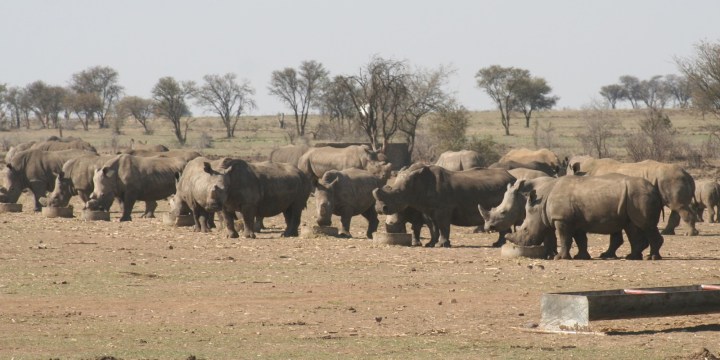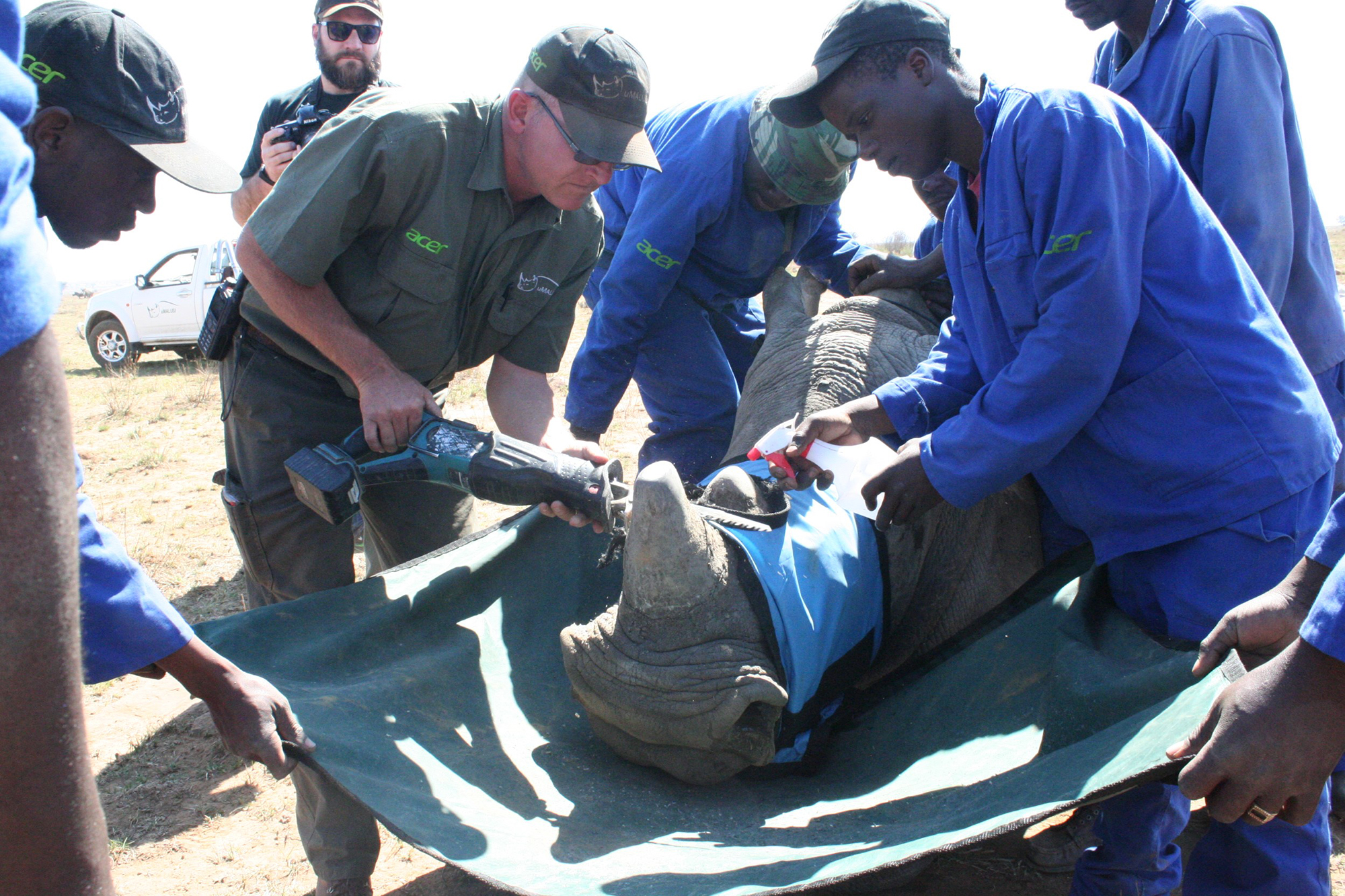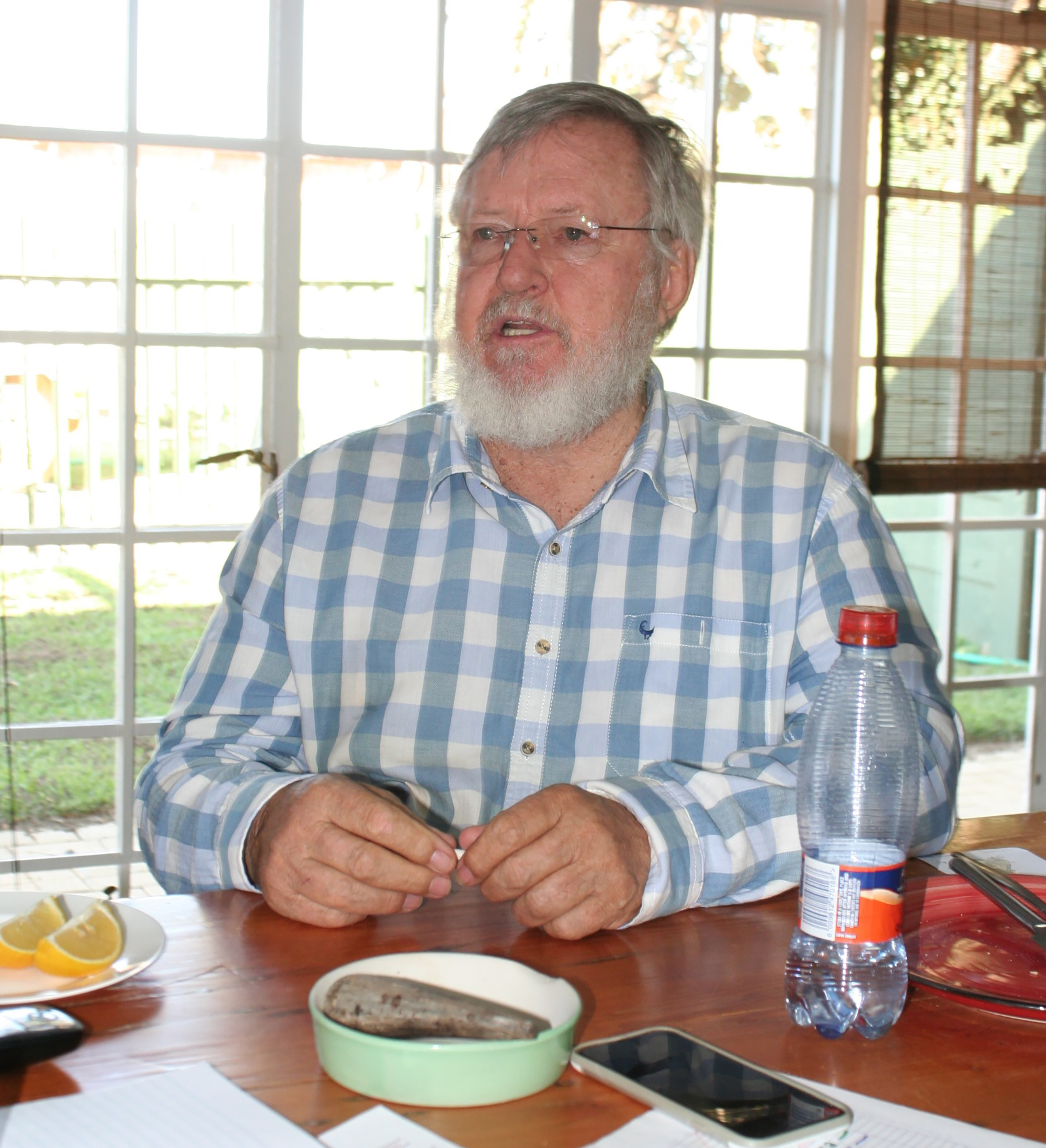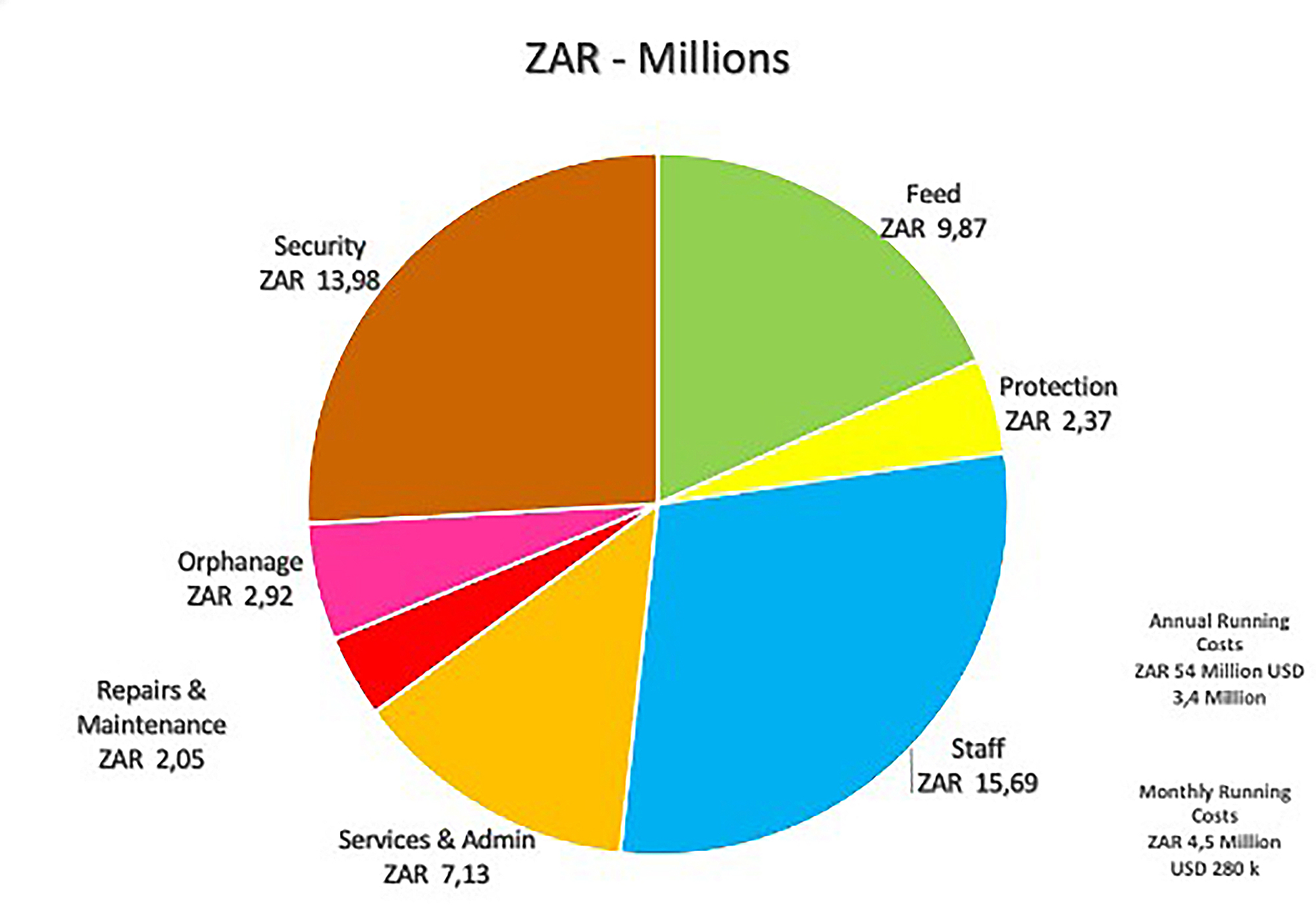SAVING PRIVATE RHINO
Wildlife baron invites investors to lock, stock and barrel sale of his rhino conservation initiative

Thirty years after embarking on a speculative – and controversial – wildlife industry venture, the owner of the world’s biggest privately owned herd of rhinos has announced plans to sell up.
The South African rhino baron John Hume, now aged 81, issued a media statement this week inviting investors to purchase his “Platinum Rhino breeding and conservation project” (and all 2,000 rhinos) at an online auction to be held in mid-April.
Hume has been cast variously as a “remarkable conservationist” and also as an avaricious speculator who helped to fuel continued global demand for black market rhino horns.
Hume has pushed strongly to overturn the 1977 global ban on rhino horn sales, arguing that there would be no need to kill any rhinos if their horns could be harvested on a regular basis and then sold legally to buyers in the Far East.

Johnny Hennop removes another horn for stockpiling at John Hume’s ranch in North West. (Photo: Supplied)
But with anti-poaching and breeding costs mounting steadily, Hume appears to have taken a business decision to pack up his rhino breeding business for good, hoping that wealthy investors or philanthropists will see some merit in keeping his venture alive – either for similar commercial reasons or to “rewild” them.
Five years ago, Hume invited investors to take up to a 50% interest in his 8,500 hectare rhino breeding ranch in North West – but there were no takers.
In 2019, he put up a separate property (Mauricedale Game Farm near Kruger National Park) for auction to defray his costs, but not a single buyer came forward when the auctioneer opened the bidding.
His previous attempts to sell a small portion of his massive stockpile of rhino horns in an online auction in 2017 also fell pretty flat, as buyers clearly saw little merit in purchasing horns legally in South Africa when they were prevented from selling them on to buyers in China, Vietnam or elsewhere due to an international ban by the Convention on International Trade in Endangered Species (CITES).
Though Hume won a significant court battle in 2015 to overturn a government ban on the domestic sale of rhino horns within South Africa, his more recent forays in the courts have been less successful.
In 2021, Hume sought a court order for the return of nearly R10-million worth of horns which had been seized by the police in an undercover operation by the Hawks during an investigation into black market rhino sales by Hume and other parties.
Two men, Clive John Melville and Petrus Steyn, pleaded guilty and were convicted on charges of engaging in restricted wildlife activities without permits – to wit, possession of 181 white rhino horns that originated from Hume’s secure banking vault in Centurion, Pretoria.
Hume denied any legal wrongdoing in the affair and sued to have the horns returned to him, but Acting Judge SK Hassim found it hard to swallow his story that he had released the horns from his banking vault to a certain Mr Allan Rossouw of Port Elizabeth – a man he had never met – as part of a legal domestic rhino horn transaction.
Visit Daily Maverick’s home page for more news, analysis and investigations
Counsel for the Hawks and a senior police investigating officer told the court that Rossouw never intended to buy the horns and had merely agreed to have the sale permit registered in his name in exchange for cash.
“This and the other strange features of the transaction between (Hume) and Rossouw,” she argued, “show not only a sham transaction to disguise the illegal sale of the 181 horns, but they show (Hume’s) complicity.
“It was submitted that, in the circumstances, the 181 horns should not be returned to (Hume) before he has explained his involvement and his conduct and that the proper forum for this is not a civil court, but the criminal court,” Hassim declared in a judgment in January 2022.
“(Hume’s) version of events strikes me as most bizarre. It is astounding that a self-professed businessman would voluntarily release valuable assets, such as rhino horns, from his control and custody, entrust them to a ‘potential buyer’ he has never personally met for inspection in the hope that the potential buyer becomes a buyer of the 181 horns at a reasonable price to be agreed. It defies logic why the potential buyer could not inspect the horns at the Centurion vault…
“It is implausible that any person, let alone a self-professed businessman, would release from his control and custody not a few, but all 181 horns, each valued at around R60,000, to a potential buyer without any assurance that the potential buyer intended buying one of them, let alone 181. This scenario borders on the preposterous.”
Hume also lost another civil case in 2020 where he took on national Environment Minister Barbara Creecy, in a case where he was refused permission to sell and export 11 rhinos to a Vietnamese buyer.
Now Hume has averred that he wants to pack up his venture for good and look for a buyer “with a passion for conserving rhinos and the means to keep the breeding project going”.
He argues that his venture has the potential to “save rhinos from extinction”.
“With 200 rhinos born a year, the project has the power to make a significant difference and bolster declining rhino populations on the African continent.
“We have so much rewilding power here,” the project’s wildlife veterinarian, Dr Michelle Otto, said in a statement.
“The project’s rhino could repopulate the whole of Africa, where we lose hundreds of rhinos each year to poaching. We have rewilding partners on board, but the project needs funding and it needs the right person to continue to drive it in the right direction.”
That might seem like a tall claim to make, but in the context of the unrelenting massacre of South Africa’s national rhino herd, it’s worth noting that Hume’s project has preserved at least 2,000 rhinos – just slightly fewer than the remaining population of rhinos in Kruger National Park.
Over the last decade, South Africa has lost close to 10,000 rhinos to poachers – mostly in state or provincial parks.
Dr John Hanks, a zoologist with a PhD from Cambridge on elephant population dynamics and a former director of the Africa Programme for WWF International, has provided a strong endorsement for Hume’s Platinum Rhino venture.
“This is an outstanding contribution to the long-term security of the species, for which (Hume) deserves an enormous vote of thanks and appreciation from the international conservation community. This remarkable success could not have been achieved without an unprecedented level of financial support, all of which has come from John’s life savings.
“Protecting rhinos in today’s world from the increasing attacks by poaching gangs is an extremely expensive operation, as all the government conservation agencies in Africa know only too well.”
Dr George Hughes – a veteran conservationist and former chief executive of the Natal Parks Board/Ezemvelo KZN Wildlife, who favours a legal trade in rhino horn – said this week that Hume’s decision to put his rhino breeding enterprise up for auction was likely to be “a great disappointment to both John and to rhino conservation”.
“I know that John was often criticised. But he should have been awarded a Nobel Prize for rhino conservation, whatever his motives. He has looked after a significant portion of the world’s rhino population at his own cost.
“John could be a difficult customer, but the effort he has made to look after his animals is admirable.”
On whether he thought a buyer might appear to rescue Hume’s breeding project, Hughes said: “I honestly don’t know… It might be picked up by someone in Europe or the USA… someone like Elon Musk, possibly.”
The flip side, he suggested, was that Hume could be forced to sell off his rhinos cheaply to defray expenses – or be compelled to “surrender” them as part of a government scheme.
He said that while it had become fashionable for animal rights group to oppose the hunting or sale of wildlife, the private sector had made “a fantastic contribution to rhino conservation”, notably in South Africa, Kenya and Namibia.
Our Burning Planet’s initial attempts to contact Hume directly for comment and clarification about the auction did not succeed.
However, in response to written queries on 13 February, Hume responded by email to confirm that he planned to sell “the entire Southern White Rhino conservation project, including other wildlife (300) & domestic livestock, security infrastructure and assets”.
“Auctioning the project is to bring attention to the opportunity for a new owner to take over the success of the project saving the species from extinction & its potential to rewild…
“I am proudly 81! There are many views of what conservation means. I have bred rhinos for 30 years. I know these rhinos, their habits, their social structures, and I am pleased with my contribution to conserving the species. My wish is to hand over this responsibility to a new custodian as dedicated and visionary as I have been.”
Further information about the auction would be disclosed closer to the event on the website below: https://platinumrhino.co.za/auction/
What about his significant stockpile of rhino horns harvested from live rhinos and natural deaths over the last 30 years? Is he also selling that?
“No,” he stated.
But there was one question he dodged, or overlooked:
Was his decision to sell the business a final acknowledgement that the lifting of the CITES ban on rhino horn sales was unlikely to occur in his lifetime?
The answer to that question can, perhaps, be found in an article published in 2018 by the Save the Rhino charity group:
“We have considered options available to Mr Hume and, unless a new buyer for Buffalo Dreams Ranch and its rhinos in entirety can be found, believe it will be necessary to pursue a combination of strategies to safeguard the 1,626 Southern white rhinos.
“John Hume is clearly a passionate individual who cares for his rhinos. However, his business model has always been premised on a legalised trade in rhino horn, without – seemingly – a contingency plan for what might happen to these rhinos if the trade ban continued. The lack of a back-up plan has, unfortunately, brought us to today’s situation.
“While we cannot fund a rescue plan, we sincerely hope that the outcome, which may be a combination of options, is truly in the rhinos’ best interests and for genuine rhino conservation reasons.” DM/OBP






















 Become an Insider
Become an Insider
Great article Tony. And well done for giving prominence to George Hughes views on the matter. I know John Hume and I think George is spot on. I alos point out that CITES does not ban the trade in Rhino Horn outright. The sale of horn from a registerd captive breeding facility is allowed. The trouble is that Environmental Affairs is unlawfully frustrating the registraion of such facilities. The real failure here is that of the conservation departments like Environmental Affiars who like dogs in the manger are defending their historic monoploy over the resource to the detriment of the resource itself.
When Environmental Affairs finally realize that their policies have allowed the rhino to disappear from public view, and they allow the sale of rhino horn, will it be too late? Will the gene pool be too small? Will all the private owners have gone bust?
However, if Environmental Affairs were to legalise the trade now, and by some chance it doesn’t work, there would still be a chance to try something else.